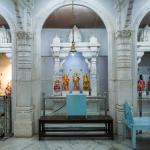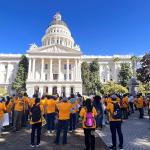This is another story on Netaji’s disappearance and how the KGB spy-Congress controversy is linked!
The controversy surrounding the mysterious disppearance of Netaji Subhas Chandra Bose in August 1945 has taken a new twist with the ex-KGB archivist Vasili Mitrokhin’s explosive findings, published in The Mitrokhin Archive: The KGB and the World.
A key deponent of the Mukherjee Commission, Purabi Roy, who took off for Moscow on Monday night, claimed that Mitrokhin knew about Bose’s Russia link and had helped her locate classified information on him.
Roy, who first chanced upon some classified documents on Bose in the KGB archives in Russia in 1995, is accompanying the Mukherjee Commission, which is probing the disappearance of Bose.
The team left for Moscow on a late night Aeroflot flight on Monday.
Accompanying Justice Manoj Kumar Mukherjee and his Principal Private Secretary N R Panja are Subrata Bose, Forward Bloc MP, Keshab Bhattacharjee, Forward Bloc member and advocate, Madhusudan Pal, a government doctor, Purabi Roy, rsearcher, Dwarkanath Bose, a member of the family, and Rama Banerjee, a lecturer of Rani Birla College.
The team will examine key witnesses and look for classified information on Bose on 21, 21st and the 22rd in Moscow, 23rd, 24th and 25th in St Petersburg, 26th and 27th in Irkhutsk, 28th, 29th and 30th in Omsk and return to India on the October 1.
But Purabi Roy, who has submitted four affidavits till date in front of the Mukherjee Commission till date, is worried. ‘‘My key worry is that the Commission should be allowed access to classified documents in three archives, the Federal Security Bureau — which was called the KGB in the Soviet era, the President’s archives in Kremlin and GRU — the military intelligence archive.
After all, the Commission has been asking for permission for visiting Moscow for the last three and half years, Roy told Newsline before her departure.
While the Kremlin and the GRU archives are in Moscow, Omsk, Irkhutsk and St Petersburg have ostensibly some links with Bose’s disappearance. While Omsk is geographically close to Manchuria, from where it is believed that Bose entered Russia in 1945, Irkhutsk is the venue of the concentration camp, where many believe Bose was housed.
Officially, the Mukherjee Commission has permission to access documents in the ‘‘reading halls’’ of the archives.
The Commission will have to submit a final report by November 14.















